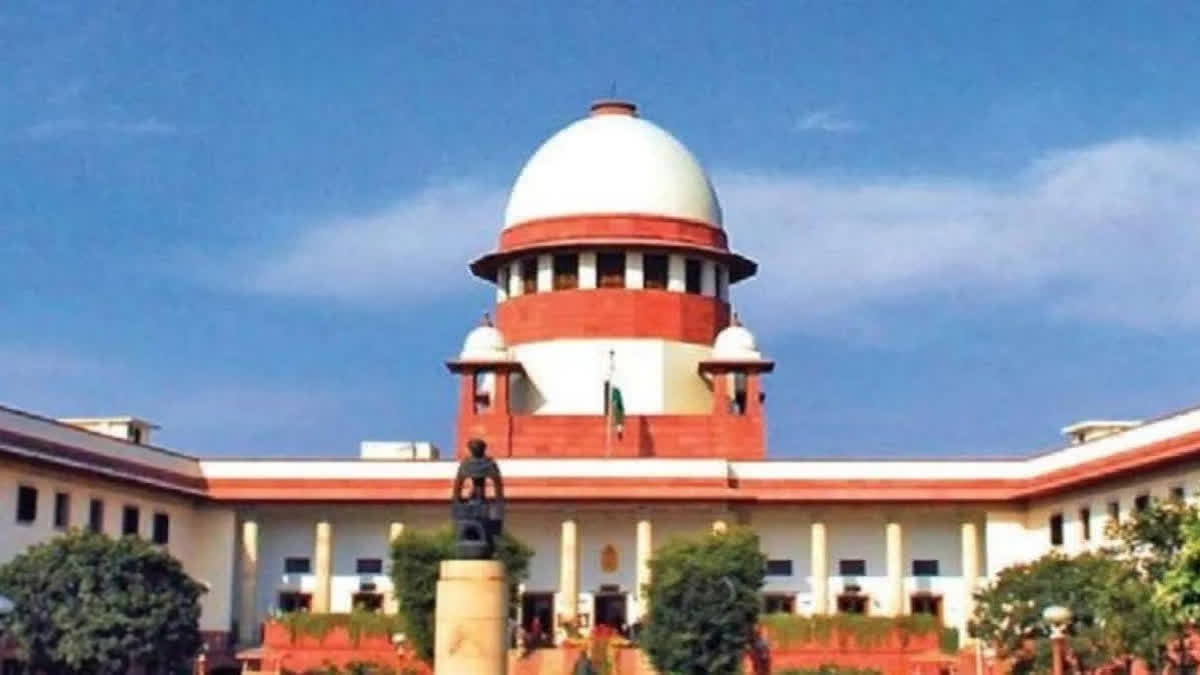New Delhi: The Supreme Court on Tuesday reserved its judgment on petitions challenging the constitutional validity of Section 6A, which was inserted in the Citizenship Act, 1955, following the signing of the Assam accord. A constitution bench headed by Chief Justice DY Chandrachud, also comprising Justices Surya Kant, M M Sundresh, J B Pardiwala and Manoj Misra, heard arguments from a batter of senior advocates -- Attorney General R Venkataramani, Solicitor General Tushar Mehta, senior advocates Shyam Divan, Kapil Sibal, Sanjay Hedge, C U Singh and others -- for four days before reserving its verdict.
Today, during the hearing, Mehta highlighted the progress on fencing the border in West Bengal and added that the Centre’s efforts were hindered due to West Bengal's non-cooperation. Mehta said the West Bengal government follows a far slower, more complex direct land purchase policy and even for national security purposes like border fencing, there is non-cooperation by the state government. “If the State of West Bengal cooperates in acquiring the land and hands over the land for fencing, the Central government will do so," Mehta submitted.
Mehta submitted before a court, “We have a porous border. They come clandestinely and therefore it is not possible to give an exact figure. It may not be an accurate figure. But, the situation is grim. I will not dispute the petitioners on that”.
Senior advocate Sanjay Hedge, representing one of the parties in the matter, contended that while on the western border, it was drawn, on the eastern border, it was kept fluid, and stressed that the Indian citizenship is not ethno-nationalist. He said it is not based on language, religion, or culture and also there is no superior or inferior citizenship based on the ancestry of any time.
Senior advocate CU Singh submitted that the petitioners were not merely seeking their rights, but were attempting to strip away the rights accrued to others over several decades, and emphasized that Section 6A, which allowed the determination of foreigners as per the Assam Accord, did not violate Article 14 of the Constitution.
Advocate Shadan Farasat, representing a party in the matter, acknowledging the importance of the right to culture contended that it should not be used to deny someone citizenship. Farasat raised concerns about the potential shift from civic nationalism to cultural nationalism when culture is elevated to the extent of denying citizenship.
Senior advocate Shyam Divan, in his rejoinder submission, vehemently argued that there was no temporal limit to the operation of Section 6A, meaning that individuals could still apply for citizenship under Section 6A today. Divan said there was no machinery or mechanism for evaluating, assessing, or determining the grant of citizenship under Section 6A (2) and pointed out that this was a fatal flaw in the scheme of Section 6A.
Earlier this month, the apex court had questioned the government as to what steps have been taken so far to curb illegal migration into Indian territory and directed it to furnish data on the number of Bangladeshi immigrants granted citizenship in Assam between January 1, 1966, and March 25, 1971, under section 6A (2)of the Citizenship Act, 1955.
The Centre has told the Supreme Court that it is not possible to collect accurate data on such illegal migrants living in various parts of the country, since the entry of illegal immigrants into India “is clandestine and surreptitious”. The affidavit filed by the Ministry of Home Affairs said illegal migrants enter the country without valid travel documents clandestinely and surreptitiously.
“The detection, detention, and deportation of such illegally staying foreign nationals is a complex ongoing process”, said the affidavit in response to a direction by the apex court seeking details of the “estimated inflow of illegal migrants” to Assam and other northeastern states after March 25, 1971.
“Since entry of such foreign nationals into the country is clandestine and surreptitious, it is not possible to collect accurate data of such illegal migrants living in various parts of the country”, said the affidavit. The Home Secretary’s affidavit said that 17861 persons who had come into Assam between January 1, 1966 and March 25, 1971, were granted citizenship. Union Home Secretary Ajay Bhalla said that, however, a total of 14346 foreigners were deported between 2017 and 2022, due to reasons like overstay, visa violation, illegal entry etc.
The Centre said 32,381 of those who entered the country between January 1, 1966, and March 25, 1971, have been detected to be foreigners by an order of the Foreigners Tribunal under the Foreigners (Tribunal) Order, 1964 till October 31, 2023.
Also read: Delhi High Court dismisses Omar Abdullah's divorce plea, upholds trial court's verdict



